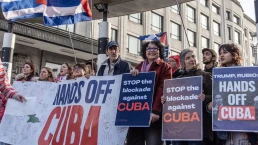The kind of progressivism that people expect from the Democratic Party has been subsumed by another politics.
By Brandan P. Buck, Responsible Statecraft
“What’s happened to the Democrats? They used to be antiwar!” Such is one of the many questions being bandied about byan online commentariat seeking to make sense of a litany of Republican endorsements of Kamala Harris, many of them made by party elites known for their hawkish foreign policy like former Wyoming Representative Liz Cheney and former Vice President Dick Cheney.
One could find similar consternation withAmerican liberals’ support for U.S. involvement in the Ukraine crisis. The confusion is based primarily on nostalgia, a selective view of history that obscures the Democratic Party’s longer, more complicated relationship with interventionism.

The reality is quite different: what we are witnessing is the latest iteration of an ongoing intraparty struggle where the dominant liberal interventionist core asserts itself over a smaller progressive noninterventionist periphery. While the latter often dominates popular conceptions of the Democratic Party and its vision for American foreign affairs, the former drives the reality of party politics.
This has been happening since the First World War, best encapsulated bythe public debate betweenColumbia professor John Dewey and one of his students, writer Randolph Bourne. While both were considered liberals of a progressive stripe, they maintained opposing views on American entry into Europe’s conflagration.
Known for his adherence to philosophical pragmatism, Dewey asserted that the war could save the world from German militarism and be used to shepherd theAmerican political economy toward a fairer, managed state. Bourne rejected this notion and argued that American entry into the war would undermine the egalitarianism of the larger progressive project and create a labyrinth of bureaucraciesthat would undermine democracy.
While Dewey’s arguments held sway as the United States entered the war, American involvement in Europe’s quarrel, compounded by civil rights abuses at home, proved Bourne posthumously correct.
Despite succumbing to the Spanish Flu in 1918, Bourne’s views of the war, bolstered by the posthumous publication of a collection of essays entitledUntimely Papers, found fertile soil in an American society horrified by the conflict. Chastened by the realities of the Western Front, interwar progressivism took on asolid strain of pacifism and opposition to centralized authority.
Recent Posts
Leading Papers Call For Destroying Iran To Save It
February 11, 2026
Take Action Now The opinion pages of the New York Times and Washington Post are offering facile humanitarian arguments for the US to escalate its…
Despite Marco Rubio’s Warnings, This is the Time to Go to Cuba in Solidarity Against the Latest U.S. Aggressions
February 10, 2026
Take Action Now When visiting Cuba, one can see quickly the terrible effects of the almost seven decades of the U.S. economic blockade of Cuba.By…
“Hands Off Cuba!”: Left Groups in Europe Mobilize Against U.S. Aggression
February 10, 2026
Take Action Now Hundreds demonstrated in Belgium in solidarity with Cuba as further mobilizations against US imperialism are planned across Europe.……
Democrats Propose Minor Reforms for ICE — and Record Funding
February 10, 2026
Take Action Now Congressional Democratic leaders are asking ICE to agree to reforms, promising to vote for $11 billion in funding for the agency if…




